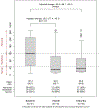Elexacaftor/tezacaftor/ivacaftor and gastrointestinal outcomes in cystic fibrosis: Report of promise-GI
- PMID: 36280527
- PMCID: PMC10144072
- DOI: 10.1016/j.jcf.2022.10.003
Elexacaftor/tezacaftor/ivacaftor and gastrointestinal outcomes in cystic fibrosis: Report of promise-GI
Abstract
Background: Elexacaftor/tezacaftor/ivacaftor (ETI) improves pulmonary disease in people with cystic fibrosis (PwCF), but its effect on gastrointestinal symptoms, which also affect quality of life, is not clear.
Methods: PROMISE is a 56-center prospective, observational study of ETI in PwCF >12 years and at least one F508del allele. Gastrointestinal symptoms, evaluated by validated questionnaires: Patient Assessment of Upper Gastrointestinal Disorders-Symptom (PAGI-SYM), Patient Assessment of Constipation-Symptom (PAC-SYM), Patient Assessment of Constipation-Quality of Life (PAC-QOL)), fecal calprotectin, steatocrit and elastase-1 were measured before and 6 months after ETI initiation. Mean difference and 95% confidence intervals were obtained from linear regression with adjustment for age and sex.
Results: 438 participants fully completed at least 1 questionnaire. Mean (SD) for baseline PAGI-SYM, PAC-SYM, and PAC-QOL total scores were 0.56 (0.59), 0.47 (0.45), and 0.69 (0.53) out of maximum 5, 4, and 5, respectively (higher score indicates greater severity). Corresponding age- and sex-adjusted 6 months mean changes (95% CI) in total scores were -0.15 (-0.21, -0.09) for PAGI-SYM, -0.14 (-0.19, -0.09) for PAC-SYM, and -0.15 (-0.21, -0.10) for PAC-QOL. While statistically significant, changes were small and unlikely to be of clinical importance. Fecal calprotectin showed a change (95% CI) from baseline of -66.2 µg/g (-86.1, -46.2) at 6 months, while fecal elastase and steatocrit did not meaningfully change.
Conclusions: After 6 months of ETI, fecal markers of inflammation decreased. Gastrointestinal symptoms improved, but the effect size was small. Pancreatic insufficiency did not improve.
Trial registration: ClinicalTrials.gov NCT04038047.
Keywords: Inflammation; Modulators; Pancreatic insufficiency; Patient-reported outcomes measures.
Copyright © 2022. Published by Elsevier B.V.
Conflict of interest statement
Declaration of Competing Interest SJS-Consultant for UpToDate, Abbvie, Mirium, Nestle; Grant funding from Gilead, Cystic Fibrosis Foundation, NIH. SDF – Consultant for UpToDate, Abbvie, Nestle, Synspira; Grant funding from NIH, Cystic Fibrosis Foundation, Amagma Therapeutics. MRN – Consultant for UpToDate, Vertex: Grant funding from Gilead, AbbVie, Cystic Fibrosis Foundation, NIH SMR: Consultant for Vertex; Grant funding from Vertex, Cystic Fibrosis Foundation, NIH DPN: Consultant for Vertex, Genentech; Grant funding from Vertex, Cystic Fibrosis Foundation, NIH GMS: Consultant for Genentech, Electromed; Grant Funding from Vertex, Cystic Fibrosis Foundation, NIH DG: Consultant for Vertex, Abbvie, Chiesi USA, Eli Lilly AK: Grant funding from NIH, Cystic Fibrosis Foundation, SDS – Grant funding from Cystic Fibrosis Foundation and NIH MSS—Grant funding from Cystic Fibrosis Foundation
Figures


References
-
- Rowe SM, Miller S, Sorscher EJ. Cystic fibrosis. N Engl J Med. 2005;352(19):1992–2001. - PubMed
-
- Gelfond D, Borowitz D. Gastrointestinal complications of cystic fibrosis. Clin Gastroenterol Hepatol. 2013;11(4):333–42; quiz e30–1. - PubMed
-
- Borowitz D, Durie PR, Clarke LL, Werlin SL, Taylor CJ, Semler J, et al. Gastrointestinal outcomes and confounders in cystic fibrosis. J Pediatr Gastroenterol Nutr. 2005;41(3):273–85. - PubMed
-
- Boyle MP, De Boeck K. A new era in the treatment of cystic fibrosis: correction of the underlying CFTR defect. Lancet Respir Med. 2013;1(2):158–63. - PubMed
Publication types
MeSH terms
Substances
Associated data
Grants and funding
LinkOut - more resources
Full Text Sources
Medical

